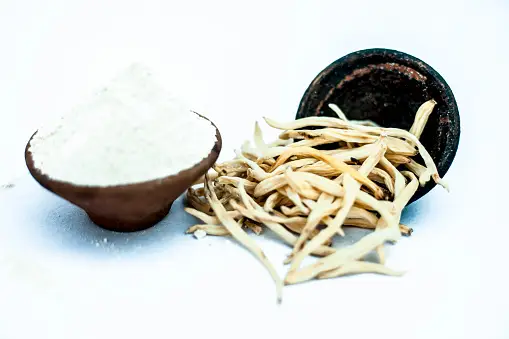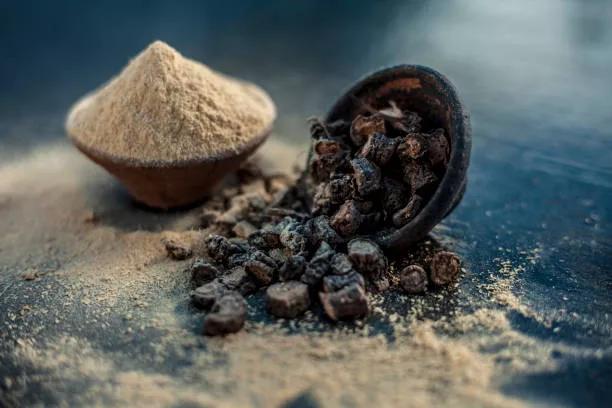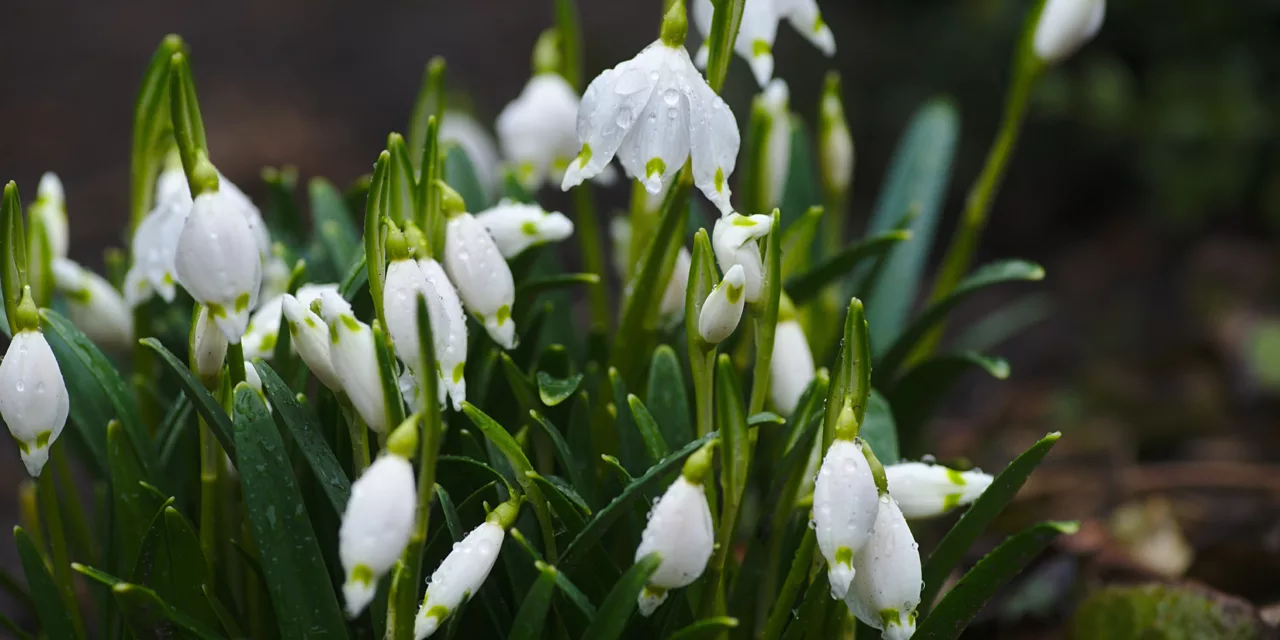Introduction to Musli:
A Herbal Marvel in Wellness Musli,derived from various plant species such as Chlorophytum borivilianum (White Musli) and Curculigo orchioides (Black Musli),stands as a prominent figure in the realm of herbal medicine,particularly within the vast tradition of Ayurveda.
Known for its potential health benefits,this herbaceous wonder has a rich history steeped in traditional practices and is finding its place in modern wellness.
Let’s embark on an exploration of the essence of musli, unraveling its origins,botanical features,and its revered status in promoting holistic well-being.Musli refers to a group of medicinal plants that are commonly used in traditional Ayurvedic medicine.
There are several types of musli, with two of the most well-known being:
1.White Musli (Chlorophytum borivilianum):
Known for its aphrodisiac properties and potential benefits for sexual health.
2.Black Musli (Curculigo orchioides):
Also used for various medicinal purposes,including as an adaptogen and for improving vitality.
Advantages
Advantages of musli may include potential benefits for reproductive health, vitality, and overall well-being.However,it’s important to note that scientific evidence supporting these claims is often limited,and individual responses may vary.
Disadvantages
Disadvantages may arise if musli is consumed in excessive amounts or by individuals with specific health conditions.Always consult with a healthcare professional before incorporating musli or any other herbal supplement into your routine.
Medicated products containing musli are often marketed for various health purposes,including as dietary supplements or tonics.It’s crucial to choose products from reputable sources,follow recommended dosages, and be aware of potential interactions with medications.
Remember,while musli is used in traditional medicine, it’s essential to approach its consumption with caution and seek advice from healthcare professionals for personalized guidance.
Safed Musli:

secret the Wonders of an Ayurvedic Marvel
Safed Musli,scientifically known as Chlorophytum borivilianum,is a revered herb deeply rooted in the rich tradition of Ayurveda.This herbaceous plant is native to India and is renowned for its various medicinal properties.
Let’s explore into the intricate details of Safed Musli, exploring its botanical characteristics, historical significance,potential benefits,and considerations for usage.
Botanical Features:
Safed Musli is a perennial herb that thrives in arid conditions.It is characterized by slender,lanceolate leaves and bears small,white flowers.The plant’s underground tuberous roots are the primary source of its medicinal properties.These roots, often referred to as “swetha musli” or “safed musli,”are the prized components used in traditional medicine.
Historical Significance:
The use of Safed Musli can be traced back centuries in Ayurvedic practices.Revered for its adaptogenic and aphrodisiac properties, it has been employed to address a range of health concerns.In traditional medicine,Safed Musli is believed to nourish various bodily systems and promote overall well-being.
Nutritional Composition:
Safed Musli boasts a rich nutritional profile, encompassing alkaloids,saponins, proteins, fibers, and essential minerals.These constituents contribute to its therapeutic potential,making it a valuable ingredient in herbal formulations.
Potential Benefits:
1.Aphrodisiac Properties:
Safed Musli has gained popularity for its potential as a natural aphrodisiac, often used to enhance sexual vitality and performance.
2.Adaptogenic Effects:
As an adaptogen, Safed Musli is believed to assist the body in coping with stress, promoting resilience and balance.
3.Reproductive Health:
Traditional uses include supporting reproductive health in both men and women, with some attributing fertility-boosting properties to Safed Musli.
4.Immunomodulatory Actions:
Preliminary studies suggest that Safed Musli may have immunomodulatory effects, potentially enhancing the body’s immune response.
Considerations and Cautions:
While Safed Musli offers promising benefits, it is essential to approach its usage with caution:-
Dosage:
Optimal dosage varies, and excessive consumption may lead to adverse effects.Always adhere to recommended guidelines.-
Consultation with Healthcare Professionals:
Individuals with existing health conditions, pregnant or breastfeeding women, and those on medication should consult healthcare professionals before incorporating Safed Musli into their routine.-
Quality of Products:
Ensure that Safed Musli supplements or herbal formulations are sourced from reputable sources to guarantee purity and potency.
Black Musli:

Exploring the Enigmatic Herb in Ayurveda
Black Musli, scientifically known as Curculigo orchioides,is a potent herb deeply ingrained in the tapestry of traditional Ayurvedic medicine.Originating in India,this herb has been revered for its multifaceted medicinal properties.
Let’s embark on a comprehensive exploration of Black Musli, unraveling its botanical intricacies, historical significance, potential advantages, and considerations for its use.
Botanical Marvel:
Black Musli is a herbaceous plant characterized by its tufted leaves and small, yellow flowers.The plant’s rhizomes and roots, often referred to as “Kali musli” or Black Musli, are the vital components used in traditional medicine.
Growing predominantly in tropical regions,it thrives in well-drained soils and is cultivated for its therapeutic potential.
Historical Roots:
The historical use of Black Musli can be traced back through the annals of Ayurveda.Traditionally,it has been employed to address a myriad of health concerns, gaining a reputation for its adaptogenic and rejuvenating properties.
As with many herbs in Ayurveda,Black Musli is deeply intertwined with cultural practices aimed at promoting holistic well-being.
Nutrient Profile:
Black Musli boasts a rich array of bioactive compounds,including alkaloids,saponins,flavonoids, and essential minerals.This diverse composition contributes to its medicinal efficacy, making it a valuable resource in herbal formulations.
Potential Benefits:
1.Adaptogenic Efficacy:
Black Musli is revered for its adaptogenic qualities, assisting the body in coping with stress and promoting overall resilience.
2.Vitality and Energy:
Traditionally, Black Musli has been associated with enhancing vitality and energy levels, contributing to a sense of rejuvenation.
3.Sexual Health:
Similar to its white counterpart, Black Musli is often touted for its potential aphrodisiac effects, with proponents suggesting benefits for sexual health and performance.
4.Anti-inflammatory Properties:
Some studies indicate that Black Musli may exhibit anti-inflammatory effects, which could be relevant for various health conditions.
Considerations and Guidelines:
1.Dosage
Optimal dosage can vary, and it is crucial to adhere to recommended guidelines to avoid potential side effects.
2.Individual Variability:
Responses to Black Musli may vary among individuals, and it’s advisable to start with lower doses to gauge personal tolerance.
3.Quality Assurance:
Ensure that Black Musli products are sourced from reputable suppliers to guarantee purity and potency.
4.Consultation with Professionals:
Individuals with pre-existing health conditions, pregnant or lactating women,and those on medications should seek advice from healthcare professionals before incorporating Black Musli into their health regimen.
Uses of Musli:
Bridging Tradition and Modern Wellness
Musli,encompassing both White Musli (Chlorophytum borivilianum) and Black Musli (Curculigo orchioides), holds a revered status in traditional Ayurvedic medicine.Its versatile applications span both home remedies and medicinal formulations,offering a holistic approach to health and wellness.
Home Remedies:
1.Vitality Tonic:
Musli is often used in home remedies to create tonics believed to enhance vitality and energy levels.This may involve preparing a decoction or infusion using musli roots.
2.Aphrodisiac Concoctions:
In traditional settings, musli is renowned for its aphrodisiac properties.Some home remedies involve creating concoctions with musli to potentially support sexual health.
3.Rejuvenating Drinks:
Musli may be incorporated into homemade health drinks or smoothies to harness its reputed rejuvenating effects, providing a natural boost to overall well-being.
Medicinal Applications:
1.Sexual Health Formulations:
Musli,especially White Musli,is a key component in various Ayurvedic formulations aimed at addressing sexual health concerns.These formulations may be in the form of capsules, powders, or tonics.
2.Adaptogenic Supplements:
Both White and Black Musli are recognized as adaptogens,and they may be included in adaptogenic supplements designed to help the body adapt to stress and promote balance.
3.Fertility Support:
Musli is traditionally associated with fertility enhancement.Ayurvedic medicines targeted at reproductive health often feature musli as a vital ingredient.
4.Immunomodulatory Products:
Preliminary research suggests that musli may possess immunomodulatory effects.This potential has led to its inclusion in some herbal supplements designed to support the immune system.Considerations:
Considerations and Guidelines:
1.Dosage Guidelines:
Whether used in home remedies or medicinal formulations,adhering to recommended dosage guidelines is crucial.Excessive intake may lead to adverse effects.
2.Consultation with Healthcare Professionals:
Before incorporating musli into medicinal or home remedy routines,individuals with existing health conditions,pregnant or breastfeeding women,and those on medications should seek advice from healthcare professionals.
3.Quality Assurance:
Ensure that musli products, whether obtained for home use or as part of herbal formulations, are sourced from reputable suppliers to guarantee purity and potency.
Simple Musli Recipe:

A Nutrient-Packed Breakfast Bowl
Ingredients:
– 1 cup rolled oats
– 2 tablespoons White Musli powder (Chlorophytum borivilianum)
– 1 tablespoon chia seeds
– 1 tablespoon flaxseeds (ground)
– 1 cup Greek yogurt or plant-based alternative
– 1 cup milk or plant-based milk
– Fresh fruits (e.g., berries, banana slices) for topping- Honey or maple syrup for sweetness (optional)
Instructions:
1. In a bowl, combine rolled oats, White Musli powder, chia seeds, and ground flaxseeds.
2. Add Greek yogurt and milk to the mixture. Stir well to ensure all ingredients are evenly combined.
3. Cover the bowl and let it sit in the refrigerator overnight or for at least 4 hours to allow the oats and seeds to absorb the liquid.
4. Before serving, give the musli a good stir. If the mixture is too thick, you can add a bit more milk to reach your desired consistency.
5. Top with fresh fruits of your choice. Berries and banana slices work well for added sweetness and texture.
6. Optionally, drizzle with honey or maple syrup for extra sweetness.
7. Enjoy a nutrient-packed and delicious musli bowl for a wholesome breakfast.
Musli Energy Bites:
On-the-Go Snacking
Ingredients:
– 1 cup White Musli powder (Chlorophytum borivilianum)
– 1 cup rolled oats- 1/2 cup nut butter (almond, peanut, or your choice)
– 1/4 cup honey or maple syrup- 1/2 cup dark chocolate chips
– 1 teaspoon vanilla extract- A pinch of salt
Instructions:
1. In a large bowl, combine White Musli powder, rolled oats, nut butter, honey or maple syrup, dark chocolate chips, vanilla extract, and a pinch of salt.
2. Mix the ingredients thoroughly until well combined. If the mixture is too dry, you can add a bit more nut butter or honey to achieve a sticky consistency.
3. Refrigerate the mixture for about 30 minutes to make it easier to handle.
4. Once chilled, roll the mixture into bite-sized balls using your hands.
5. Place the energy bites on a tray lined with parchment paper and refrigerate for an additional 30 minutes to set.
6. Store the musli energy bites in an airtight container in the refrigerator.Grab one or two for a quick and energizing snack on the go.
These recipes provide creative and delicious ways to incorporate musli into your daily diet,offering a blend of flavors and essential nutrients for a wholesome eating experience.
Benefits of Musli-Infused Recipes:
1.Nutrient-Rich Breakfast Bowl:-
Oats for Sustained Energy:
The rolled oats in the breakfast bowl are a great source of complex carbohydrates,providing sustained energy throughout the morning.
-Musli’s Nutritional Boost:
White Musli powder adds a nutritional punch with its content of alkaloids, saponins,and essential minerals, potentially contributing to overall well-being.
-Omega-3 Fatty Acids:
Chia seeds and ground flaxseeds offer a dose of omega-3 fatty acids,promoting heart health and providing anti-inflammatory benefits.
-Protein from Greek Yogurt:
Greek yogurt contributes protein,crucial for muscle repair and satiety.
2.On-the-Go Energy Bites:
-Protein-Packed Nut Butter:
Nut butter serves as a protein source,supporting muscle health and providing a satisfying snack.
-Natural Sweeteners:
Honey or maple syrup adds sweetness while offering natural antioxidants and potential anti-inflammatory properties.
-Dark Chocolate’s Antioxidants:
Dark chocolate chips provide antioxidants that may contribute to heart health and cognitive function.
– Convenient and Portable:
Musli energy bites offer a convenient, on-the-go snack option that can help curb cravings and sustain energy levels.
3.Overall Wellness:
-Balanced Nutrition:
Both recipes incorporate a balance of macronutrients (carbohydrates, proteins, fats) and micronutrients (vitamins, minerals, antioxidants), promoting overall nutritional balance.
-Fiber Content:
The recipes contain fiber from oats, seeds, and musli, aiding digestion, supporting gut health, and promoting a feeling of fullness.
-Potential Adaptogenic Effects:
Musli, known for its adaptogenic properties, may assist the body in adapting to stress and maintaining balance.
4.Versatility and Personalization:
– Customizable:
These recipes are versatile and can be adapted based on personal preferences,dietary restrictions, or specific health goals.
-Diversity of Ingredients:
The inclusion of various ingredients ensures a diverse range of nutrients,contributing to a well-rounded and satisfying culinary experience.While these recipes incorporate musli for its potential health benefits, individual responses may vary.
It’s important to enjoy these dishes as part of a balanced diet and consult with healthcare professionals if you have specific health concerns or conditions.Incorporating musli into your diet through creative and delicious recipes adds not only nutritional value but also a delightful culinary experience to your daily routine.
Primary uses of musli.
The primary usage of musli is prevalent in countries like India, where it holds a significant place in traditional Ayurvedic medicine.In India, musli, specifically White Musli (Chlorophytum borivilianum) and Black Musli (Curculigo orchioides),has been traditionally utilized for its potential health benefits.
It is integrated into various formulations aimed at addressing aspects of reproductive health, vitality, and overall well-being within the context of Ayurveda. While its usage is rooted in traditional practices in India, interest in musli and its potential benefits has led to exploration and utilization in various regions worldwide,albeit to varying extents.
Conclusion:
Safed Musli stands as a testament to the enduring wisdom of Ayurveda, offering a natural approach to holistic well-being.While its traditional uses are promising, ongoing research seeks to unravel the full spectrum of its therapeutic potential.
As with any herbal remedy, informed and judicious use, guided by healthcare professionals,is key to unlocking the benefits of Safed Musli while mitigating potential risks.
Black Musli stands as a testament to the diverse pharmacopeia offered by Ayurveda.Its rich history, coupled with ongoing scientific inquiry, underscores its potential as a natural remedy.
While traditional uses paint a promising picture, the careful and informed integration of Black Musli into one’s health routine, guided by healthcare professionals, ensures a balanced approach.
As research continues, Black Musli remains a captivating herb, inviting exploration into its nuanced contributions to holistic well-being.Musli’s integration into both home remedies and medicinal applications showcases the seamless blend of tradition and modern wellness practices.
While its uses have deep roots in Ayurveda, ongoing research aims to further understand and validate its potential benefits.Whether enjoyed as a homemade tonic or included in specialized formulations, musli continues to captivate as a natural resource for promoting holistic health.
As with any herbal remedy, a balanced and informed approach, guided by healthcare professionals, ensures optimal well-being.
you must watch this article
Tea Blossom Bliss: White Tea Shot Recipe.





